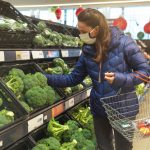

Facemask use to continue until April as First Minister sets out COVID transition plans

Face coverings are to continue to be worn on public transport and most indoor public settings until at least early April, after the Scottish Government rowed back on plans to lift the legal restrictions on mask wearing.
However, the remaining legal requirements for businesses and those in hospitality to collect customer details for contract tracing, and to have regard to and take reasonable measures set out in COVID guidance, will end as planned on Monday, March 21.
The delay to the lifting of legal restrictions on face masks comes as a result of a spike in COVID case numbers, both nationally and in Orkney, which has one of the highest infection rates in the UK.
The latest data shows that 2,450.9 cases per 100,000 were in Orkney, putting a widespread and significant strain on a number of services, notably schools, nurseries, and health and care settings.
Nicola Sturgeon said the legal restrictions to mask wearing will be reviewed again in two weeks, where it is likely to be converted to guidance by April 4.
The First Minister also confirmed that people without COVID-19 symptoms will no longer be asked to take regular lateral flow tests from April 18.
The change forms part of the Test and Protect Transition Plan, which sets out how testing will become more targeted, with the aim of reducing serious harm from COVID-19.
The changes to Test and Protect mean that from April 18:
- most people without symptoms will no longer be asked to take COVID-19 tests.
- free lateral flow devices (LFDs) for the purposes of twice-weekly routine testing will no longer be available for the general population, but will continue to be free for any purpose for which testing continues to be advised — for clinical care, for health and social care workers and for people visiting vulnerable individuals in care homes or hospitals.
- until the end of April, people with symptoms should still isolate and get a PCR test.
- vaccinated close contacts of someone with COVID-19 should continue to test daily for seven days with LFDs.
People who have symptoms of COVID-19 will still be able to book PCR tests in the usual way until April 30.
From that date, test sites will close and people with symptoms will no longer be advised that they need to seek a test.
The public health advice for people who feel unwell will be to stay at home until they feel better, to reduce the risk of infecting other people.
The First Minister said on Tuesday that her announcement “marks a further decisive shift away from controlling COVID through legal restrictions, and towards relying instead on advice and guidance.”
She said she knew that retaining facemasks for at least two weeks more than planned would be “disappointing” for businesses and service providers.
Ms Sturgeon said: “However, ensuring maximum continued use of face coverings will provide some additional protection — particularly for the most vulnerable — at a time when the risk of infection is very high, and it may help us get over this spike more quickly.
“We will review it again in two weeks — before the Easter recess — and our expectation now is that this regulation will convert to guidance in early April.”
She continued: “Changes in Test and Protect will be phased between now and the end of April. After Easter — from April 18 — we will stop recommending that people who don’t have symptoms, should test for COVID.
“This change will apply across the population — including in most workplaces and in early years centres, schools, universities and colleges.
“Then, at the end of April, routine testing will end — even for people who have symptoms.
“At that time, physical test sites will close — although some mobile testing units and capacity will be retained for possible future use. Contact tracing will also end.
“Free testing will not generally be available to the wider population. Instead, our advice will be that if you have symptoms of COVID — or indeed symptoms of the flu, or any other infectious illness — you should stay at home in order to aid your recovery.”